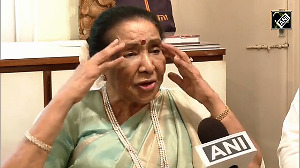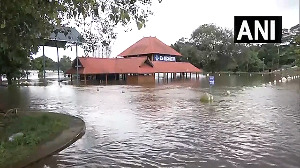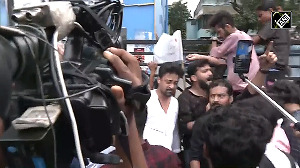How many times have you heard a minister criticising his own government? Hardly. But Wednesday was an exception.
Civil Aviation Minister Rajiv Pratap Rudy came down heavily on the bureaucracy and said: "Indian Airlines is making a loss of Rs 300 crore (Rs 3 billion). It wants to acquire new aircraft. If Jet Airways wants to purchase aircraft, the board takes a decision in 15 days and the aircraft arrive in the next 15 months. In our case, the board takes 15 years to decide."
He was speaking at the inaugural session of the Confederation of Indian Industry's fourth marketing summit.
This set the mode for the summit titled 'Battling for marketshare.'
The summit started with CII secretary-general Tarun Das paying a tribute to late marketing guru Shunu Sen who, according to Das, always led from the front in organising the summit.
Interestingly, the festival and the holiday did not keep many people away from the conference. In fact, they showed a lot of enthusiasm and curiosity by asking several questions.
When he got 36 questions for the panelists in the first session on rural marketing, Ramesh Vangal, chairman of the Scandent Group and head of the CII marketing and brand committee, said: "This is unprecedented in the history of my eight-year association with the CII."
At the session, Carlo M Donati, chairman and managing director, Nestle India, Sanjiv Gupta, CEO and president of Coca-Cola India, and Sudershan Banerjee, managing director and CEO, Dalmia Consumer Care, shared the panel to speak about their respective strategies to tap the rural market to raise market share and volumes.
The corporate bigwigs, however, refused to touch any controversial issues about their companies.
While Gupta refused to answer any questions on the ongoing pesticide controversy, Vangal refused to speak on the market speculation about his new liquor venture, saying: "Will let you know at the right time."
After discussing the opportunities in rural marketing, the next session agreed that sponsorships as a medium of marketing was fast catching the fancy of corporates.
According to Jamie Stewart, director (sales), IMG India, this was because of the decreasing efficiency of the traditional media.
Stewart asserted that sponsorship was the fastest growing marketing medium and attributed its growth to fragmentation, scant attention on the part of consumers and problems likely to be posed because of the digital future.
He said worldwide sponsorship was projected to climb 7.4 per cent to $26.2 billion in 2003 from $24.4 billion in 2002.
Andre Nair, chief executive officer, WPP Marketing Communications - South Asia, who shared the dais with him, said brands today were facing many challenges due to a spiralling media inflation, increased audience fragmentation, heightened commercial clutter and greater advertising restrictions.
In the process of brand-building, one needed to maintain a fine balance by keeping the brand contemporary and not losing sight of its core values.
The three speakers at the 'Brands - Anti Wrinkle Formula' session of the summit arrived at this consensus while talking about the reasons why some brands had held ground while others had lost out.
"Marketers are often not connected with the consumers. They need to understand their needs and anticipate changes before they rose to reposition a brand before it was too late," said Kamini Banga, managing director, Dimensions Consultancy Pvt Ltd, at the session on brands.
Agreed Adi Godrej, chairman, Godrej group, who said it was very difficult to rebuild a brand. "One should be in a position where the peak of brand performance is still to come," he said.





